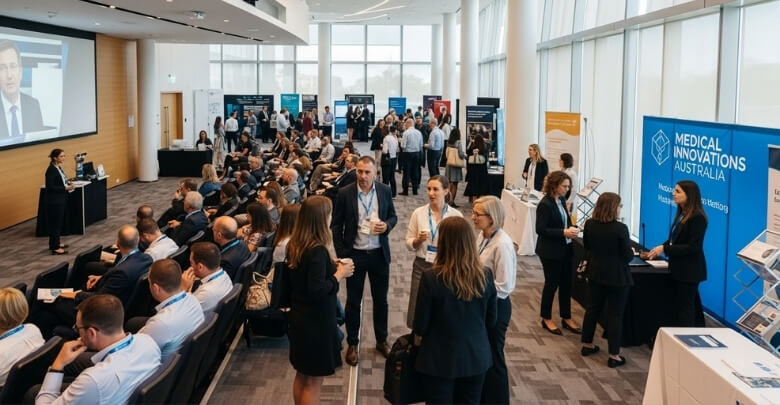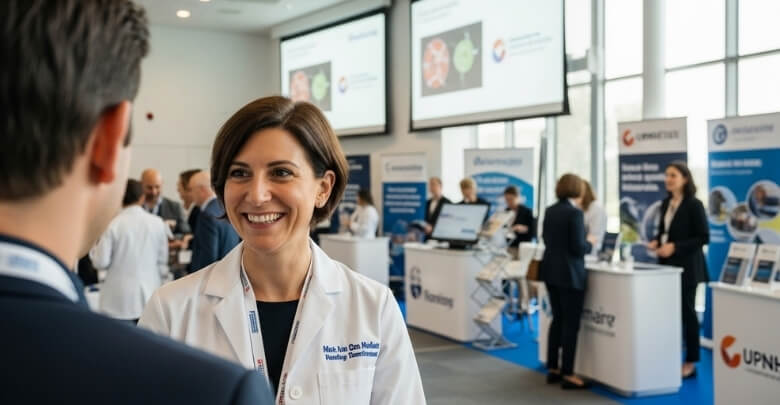Australia hosts many well-planned medical conferences these days that bring experts and learners together. These events highlight the latest research, tools, and innovations shaping healthcare today. If you are in the medical field, you may already be thinking about the benefits of attending medical conferences in Australia.
Attending medical conferences in Australia helps professionals learn about the latest research, medical tools, and advanced technologies. It also gives them a chance to gain hands-on experience through workshops and earn CME credits. These conferences allow participants to share research, meet experts, and explore new career opportunities while improving their knowledge and practical skills.
Want to explore how these conferences can shape your career in simple and helpful ways? Keep reading and you’ll find all the must-know details in this article.
Benefits of Attending Medical Conferences in Australia
Participating in medical conferences in Australia helps you grow as a professional. You can learn about new medical research and advanced technology. These events also help you meet people who share your goals and interests. Keep reading to learn more about how these conferences can help you in many ways.
Learn About New Research and Trends
These conferences help you keep up with the latest discoveries and updates in medicine. You can listen to experts, explore new ideas, and learn about current trends in healthcare. It’s a great way to stay informed about what’s happening in the medical world. This knowledge can improve your work and patient care.
Improve Practical Skills
Workshops and training sessions help you gain hands-on experience. You can try new tools, devices, and medical techniques with guidance from professionals. This helps you build confidence and improve your practical skills. Learning by doing makes you more skilled and ready for real-life situations.
Earn CME Credits
Medical professionals can earn Continuing Medical Education (CME) credits at these conferences. These credits are needed to keep your medical license active. Attending such programs helps you meet the learning goals set by your field. It’s a simple and useful way to learn and stay qualified at the same time.
Present and Improve Research
You can present your research and share your ideas with others. Getting feedback from experts helps you see what to improve. This also opens doors to new topics and future research work. It’s a chance to grow your reputation and contribute to medical knowledge.
Build Professional Connections
Meeting people from different hospitals, clinics, and universities helps you connect. These connections can lead to strong professional support and lasting friendships. You can share experiences, exchange advice, and build trust with others. These relationships can be very helpful for your career growth.
Find Career Opportunities
Conferences often connect you with people looking for skilled professionals. You may meet future employers or find out about unlisted job openings. Talking to people face-to-face can leave a strong impression. This can lead to new job offers or project collaborations.
Gain Recognition and Visibility
When you take part in discussions or present your work, people notice. It shows your dedication and helps you stand out among peers. Being active at these events makes you known in your field. This recognition can help you advance your career and reputation.
Discover New Medical Products
Many conferences have exhibit halls where companies show their latest tools and materials. You can see new equipment and learn how it works. This helps you decide what could be useful in your work. Seeing products up close makes it easier to understand their value and use.
Get Inspired and Stay Motivated
Attending conferences in Australia can refresh your mind and spirit. Meeting new people and hearing new ideas keeps you excited about your profession. You get time to think, relax, and return with fresh energy. These experiences often bring new motivation and purpose to your daily work.
Can Anyone Benefit from Attending Australian Medical Conferences?
Yes, anyone with an interest in health or medicine can benefit from joining these helpful events in Australia. Doctors, nurses, students, and researchers all gain something new. Whether you’re working in a clinic or studying medicine, there’s value in listening, learning, and asking questions.
These events are open to many, and eligibility to join medical conferences in Australia is often simple and clear for most people. Some may need a background in healthcare, while others just need interest and willingness to learn. Every session, talk, or meet-up gives a chance to grow and connect with others.
Even if you’re not presenting or working in a hospital, there’s still much to take away. You can learn new ideas, see new tools, and hear from experts. These conferences are a chance to learn, ask, share, and feel part of something important.
Challenges Participants May Face at Australian Medical Conference
In Australia, going to a medical conference can be exciting and worthwhile. But like any event, it can come with some challenges. Knowing what to expect helps you prepare and make the best of your time. Read below to learn about the common problems and how you can handle them easily.
Adjusting to New Environment
Many participants travel long distances to attend these conferences. Adjusting to time zones, new places, and weather can be tiring. It takes time to settle and stay focused on sessions. Planning travel and rest before the event helps reduce tiredness and keeps you active during the conference.
Managing Tight Schedules
Conference days are usually packed with talks, meetings, and workshops. It can be tough to join every session and still stay alert. Making a daily plan helps manage your time better. Choose sessions that match your interests and leave short breaks for rest and meals.
Handling Communication Barriers
Participants come from many countries with different accents and ways of speaking. Sometimes, this makes it hard to understand discussions or questions. Listening carefully and asking politely for clarity helps. Staying patient and friendly also makes it easier to connect with other professionals.
Dealing With High Costs
Travel, hotel stays, and conference fees can be costly for many people. Budgeting early and finding group discounts can help save money. Some events also offer student or early-bird rates. Checking these options before registering helps you attend without stressing about finances.
Feeling Overwhelmed by Information
These conferences share a lot of new research, data, and ideas. It’s easy to feel overloaded by the amount of content shared. Taking short notes and focusing on key topics helps you remember more. You can always review recorded sessions later for better understanding.
Networking Pressure
Meeting new people can make some feel shy or unsure. It’s normal to feel nervous while starting conversations. Smiling, asking simple questions, and joining group chats can help. Over time, talking becomes easier, and you may build meaningful professional connections.
Technical or Logistical Problems
Sometimes, issues like delayed sessions, tech glitches, or missing materials can occur. Staying calm and patient helps handle such small troubles better. Organizers are usually quick to fix these problems. Keeping digital backups of schedules and documents helps you stay organized and stress-free.
Balancing Work and Conference
Many attendees still have work tasks waiting for them. Managing emails or updates during the conference can be stressful. Setting an auto-reply and finishing key work before leaving helps. This way, you can stay focused on the event without distractions from office duties.
How to Prepare for Medical Conferences in Australia to Maximize the Experience?
Preparing well for a medical conference helps you make the most of it. It lets you learn better, connect easily, and stay relaxed. Planning everything early also helps avoid stress and confusion later. Here are some smart and simple ways to prepare for your next conference:
Research the Event Details
Start by learning about the event theme, topics, and guest speakers. This helps you when finding upcoming medical conferences in Australia that match your goals and interests. Visit the event website for schedules, speaker lists, and venue details. Knowing these things early saves time and helps you make the best plan for the event.
Set Clear Personal Goals
Decide what you want to achieve before the conference begins. It could be learning new research, improving skills, or meeting experts. Writing your goals helps you stay focused during the sessions. With clear goals, you can spend time wisely and make your conference experience more useful.
Plan Your Schedule Early
Check the conference timetable and mark your top sessions first. Leave breaks between sessions to relax and take notes. Avoid trying to attend everything in one day. Having a well-balanced plan keeps you fresh, active, and ready to enjoy every part of the conference.
Arrange Travel and Stay
Book flights and hotels early to avoid last-minute trouble. Staying near the venue saves travel time and makes mornings easier. Look for discounts or deals through the conference website. Organizing your travel well helps you focus on learning instead of worrying about arrangements.
Prepare Study Materials
Bring a notebook, pen, and any digital device you use for notes. Reading abstracts and speaker bios before the event helps you follow sessions easily. Highlight questions you want to ask or topics you want to explore. Being prepared this way helps you learn faster and remember more.
Build a Networking Plan
Think about people or groups you’d like to meet during the event. Making a short introduction about yourself helps break the ice. Joining social sessions or group discussions makes meetings easier. Good networking can help you build lasting professional contacts and gain valuable advice.
Manage Time and Energy
Conference days can be long, so rest well the night before. Eat light, stay hydrated, and take short breaks when needed. Avoid staying up too late after evening events. Taking care of your health keeps your mind sharp and your energy high throughout the conference.
Review and Follow Up
After returning home, go through your notes and materials. Send follow-up emails or messages to people you met. Reviewing what you learned helps you apply it better in your work. Staying in touch with new contacts keeps your professional network active and growing.
Tips on Applying the Experience of Medical Conferences in Australia
Learning doesn’t end with attending a medical conference. The real value comes when you apply what you learned. Using new ideas and methods can improve both your work and confidence. Read below to discover simple and effective ways to use your conference experience in daily practice.
Review and Organize Notes
After the event, take time to review your notes carefully. Sort them by topic or subject for easy reading later. Highlight key points and useful ideas shared by speakers. This step helps you remember what matters most and apply those lessons in your daily medical activities.
Share Knowledge With Colleagues
Talking about what you learned helps others grow as well. You can organize short meetings or group discussions at your workplace. Sharing your notes and ideas shows teamwork and leadership. It’s also a good way to reinforce your own learning while helping your coworkers stay updated.
Implement New Techniques
Try using new tools, methods, or techniques you discovered at the conference. Start with small steps and test results carefully. Learning by doing helps you understand better and gain confidence. It also shows your commitment to improving patient care through better medical practices and knowledge.
Stay in Touch With Contacts
Networking does not end when the conference finishes. Stay in touch with people you met through messages or emails. Sharing updates or discussing ideas keeps your connections strong. These relationships can help you in future research or upcoming medical events.
Keep Learning and Exploring
Every conference gives you a base to keep learning more. Follow up on topics that caught your interest during sessions. Reading research papers or attending related workshops adds more depth to your knowledge. Keep your curiosity alive and make learning a regular habit.
Apply Ideas to Patient Care
Use what you learned to improve your daily medical work. It could be a new diagnosis method or a better way to comfort patients. Applying these skills shows real growth and professionalism. Small changes based on new knowledge can make a big difference in patient outcomes.
Reflect on Your Experience
Think about what went well and what could be improved next time. Reflecting helps you prepare better for future conferences. It also helps you see how your work has changed after applying new skills. Writing a short summary of your experience is a good way to track progress.
Frequently Asked Questions
You may have some questions about medical conferences held in Australia. These FAQs will help you understand more about what to expect. They cover helpful details about attending, learning, and growing through these events. Read on to get clear and easy answers to common questions.
What Makes Australian Medical Conferences Unique?
Medical conferences in Australia are known for their high-quality speakers and global participation. They mix learning with practical sessions and open discussions. The events bring professionals from different medical fields together. This makes them great for both knowledge sharing and networking opportunities.
What Should I Wear to a Medical Conference?
Dressing professionally helps you make a good impression at conferences. Most attendees choose business-casual outfits that are neat and comfortable. It’s smart to wear clothes suitable for long days of walking and sitting. Proper attire shows respect for the event and the speakers.
Can I Attend if I Am Not a Doctor?
Yes, you can attend even if you are not a doctor. Many attendees include nurses, researchers, students, and healthcare workers. These conferences cover wide topics suitable for different roles. As long as you are interested in health or medicine, you are welcome to join.
How Can I Make the Most of Networking Sessions?
To make the most of networking sessions, start small conversations and be friendly. Ask about others’ work and share your own interests. Exchanging contact details can help you stay connected later. Networking works best when you show genuine interest in learning from others.
Are Group Discounts Available for Attendees?
Many conference organizers offer group discounts for teams or institutions. Booking early and registering as a group can save money. It’s also fun to attend with colleagues and discuss what you learn. Always check the official website for available group offers or early registration rates.
How Early Should I Register for a Conference?
It’s best to register as early as possible, ideally a few months before. Early registration often gives you cheaper fees and better hotel choices. It also ensures you get a seat in popular workshops. Planning early makes your experience smoother and less stressful.
How Can I Find Reliable Conference Information?
Always use trusted sources such as official websites, medical associations, or universities. Social media pages and newsletters also share updates about events. Reading reviews or feedback from past attendees can help too. Checking these sources ensures you join a real and well-organized conference.
Bottom Lines
Stepping into a medical conference is more than just attending a few talks. It’s about learning real things that you can use, meeting helpful people, and feeling more confident in your field. These events can refresh your thinking, boost your skills, and open up new chances you didn’t expect.
The real benefits of attending medical conferences in Australia go beyond just earning credits or hearing from experts. You grow, you connect, and you bring back ideas that make a real difference in your daily work. Whether you’re starting out or have years of experience, there’s always something new to take home and apply.








